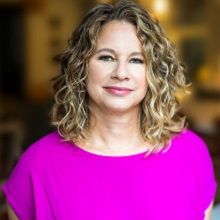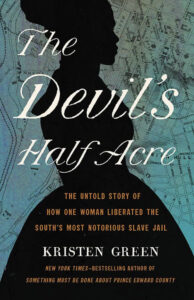An archaeological dig revealed the remnants of a notorious slave jail in Richmond. The groundbreaking discovery led journalist and Mary Washington graduate Kristen Green ’95 to use different tools to unearth information about Mary Lumpkin, a formerly enslaved woman who began her family’s quest for freedom on that site.
Kristen, an award-winning reporter and author, utilized the writing, critical thinking and rigorous research skills she honed through her college journalism courses to piece together a riveting portrait in her 2022 book, The Devil’s Half Acre (the jail’s nickname). Documents, deeds, death certificates, and more weave a tale of a woman all but erased from the American narrative.

“We know figures like Harriet Tubman, but most enslaved women didn’t try to escape because they wouldn’t have left their children behind,” Kristen said. “Instead, Mary Lumpkin used her agency … to secure an education and freedom for her children, nearly a decade prior to the Civil War.”
Kristen will shed light on Lumpkin’s story – including how she became known as the mother of Virginia Union University, one of the country’s oldest Historically Black Colleges and Universities – on Thursday, Feb. 8, for the William B. Crawley Great Lives Lecture Series. A part of UMW’s 2024 Black History Month Celebration, Mary Lumpkin: Enslaved Woman, Liberator will be held in George Washington Hall’s Dodd Auditorium at 7:30 p.m. Sponsored by LINKBANK, the lecture is open to the public and free of charge and will be posted online shortly after the event.
The lecture reunites Kristen – a member of UMW’s inaugural Alumni of Distinction class – with series founder and Distinguished Professor Emeritus of History William Crawley. She cites him as the reason she chose to attend Mary Washington, after a chance encounter when she was working at her high school job in a furniture store.
“I naturally followed Kristen’s progress with great interest, while she was a student and in her journalism career,” Dr. Crawley said. “I’m so proud of what she has accomplished.”
Kristen said taking courses in history, religion, historic preservation, and English pointed her toward the interdisciplinary American studies major. She also registered for every class with Steve Watkins, who taught journalism at UMW for over two decades.
“I came from a small town and had never encountered anyone like him,” said Kristen, who joined the student newspaper, then called The Bullet. “He encouraged me to question everything.”
With that curiosity, she earned a master’s degree in public administration from the Harvard Kennedy School and wrote for the Boston Globe, San Diego Tribune, and Richmond Times-Dispatch. Covering other communities inspired her to take a closer look at her own hometown.
Her New York Times bestseller, Something Must Be Done About Prince Edward County, investigated how the Virginia community shuttered public schools, rather than admit Black students, after the U.S. Supreme Court’s landmark Brown v. Board of Education decision.

“I had only been told parts of the story,” said Kristen, who explored her own family’s role, learning that her grandfather helped open the segregated private academy that she herself attended as a child. “That’s what my books have become – this history hidden in plain sight.”
That’s what drew her to Mary Lumpkin, who was forced to bear the children of a brutal slave trader, Robert Lumpkin, but used her limited resources to help them have a better life. And Kristen wanted to share the stories of other enslaved women who were exploited during the domestic slave trade.
She used the Library of Virginia and Ancestry.com to trace Mary Lumpkin’s journey through personal correspondence, court documents, wills and deeds, census and city directories, slave manifests, advertisements, news articles, and birth, marriage and death certificates.
“There are so many little records that seem like nothing, but when you put them together, a story starts to form,” said Kristen, who also used recorded interviews with formerly enslaved people from the early 20th century to round out what Mary Lumpkin’s life might have looked like.
Mary Lumpkin saw a different future after Robert died, Kristen said. “She … found freedom, mobility and love and carved out a life of her own.”
A complete lineup of Great Lives lectures, including dates, speakers and sponsors, can be found at umw.edu/greatlives. Learn more about Kristen Green’s work at kristengreen.net. Read more about UMW’s inaugural Alumni of Distinction class.
– Article written by Assistant Director of Advancement Communications Jill Graziano Laiacona ’04